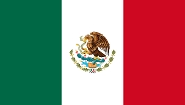Government/Policy

March 26, 2019
Mexico Renews 15% Tariff on Steel Imports
Written by Sandy Williams
Mexico has renewed the 15 percent tariff on imports of iron and steel products from countries with which it does not have a free-trade agreement. The tariffs cover 186 products and were originally introduced in 2015 to protect domestic producers from Asian imports. The newest renewal cites the “crisis facing the international steel market caused by the reduction in the growth of demand and global production overcapacity.”
Said a presidential decree issued March 25:
“The persistence of the absence of conditions for distortion-free competition between the steel industries of different countries, combined with a fall in prices and a diversion of trade due to the increase in the world supply of steel, makes it necessary and urgent to establish an increase of the general import tax for 186 tariff fractions of steel products, of sheet-plate, roll-plate, cold rolled, hot-rolled laminate, wire rod, seamless pipes, welded pipes, coated sheet, rod and profiles.”
The tariffs were renewed in 2016, 2017 and 2018 and most recently expired on Feb. 1. The tariffs are within levels permissible under the World Trade Organization and will be in effect for 180 days.
“The steel industry acknowledges to the Government of Mexico the decision to renew the Decree of temporary tariffs on steel imports from countries with which we do not have trade agreements, in order to face the global crisis generated by the overproduction of steel, aggravated by the 25 percent tariffs that the United States unjustly imposed on our exports,” said Mexican steel association Canacero in a March 25 statement. “It is important to highlight that this successful decision does not impact the solid Mexican value chain since we have free trade agreements with more than 40 countries.”
Mexico is considering imposing more retaliatory tariffs on U.S. goods if a resolution to the U.S. Section 232 tariffs is not reached soon.
“The Mexican government’s position is that the application of the 232 on steel and aluminum is not justified,” Deputy Economy Minister Luz Maria de la Mora told reporters on Monday, while confirming that the U.S. has proposed imposing quotas in place of the tariffs.
“Quotas make no sense, they’re a way of managing trade,” said De la Mora. “What industry in North America needs is the elimination of this tariff and not managed trade.”







